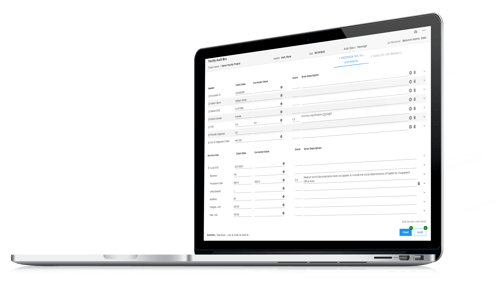Avoiding Costly Pitfalls: Best Practices in Facility Claims Audits

auditing, medical auditing, audit manager, medical auditing resources, medical auditing software, Audit Manager Facility, inpatient auditing, healthcare auditing, Facility Claims, Facility Claims Audits
Enforcement agencies often focus on “following the money.” In other words, big revenue usually is associated with compliance scrutiny – and some of the biggest revenue generators are facilities. This is partially why enforcement agencies, like the U.S. Health and Human Services Office of Inspector General (OIG), regularly perform coding audits on facility claims. It is also why your organization should be auditing or performing facility claims reviews as well.
For example, in September of 2023, the OIG released an audit report identifying over $41 million in improper payments to hospitals that did not comply with Medicare's post-acute-care transfer policy. These hospitals transferred patients to certain post-acute care settings, such as skilled nursing facilities (SNFs), but claimed the higher reimbursements associated with discharges to home. This was the result of using incorrect discharge status codes on claims. In their final recommendations, the OIG asked the Centers for Medicare and Medicaid Services (CMS) to:
-
- Direct the Medicare administrative contractors (MACs) to recover from acute-care hospitals the portion of the $41.4 million in identified overpayments.
- Instruct the MACs to notify appropriate providers so that the providers can exercise reasonable diligence to identify, report, and return any overpayments in accordance with the 60-day rule.
Acute-care hospitals should probably audit a sample of claims with similar characteristics as those identified in the OIG audit. To read the report in full, click here.
In February of 2023, a medical center agreed to pay the U.S. Department of Justice $21 million to settle allegations of improperly billing Medicare. One of the allegations in this case included billing for services not supported by the patients’ diagnosis or medical records. Auditing claims for substantiating documentation in the medical record is a core activity that facilities should be regularly performing. Coding and auditing professionals are familiar with these kinds of reviews and should be engaged to review claims on a regular basis.
A Common Pitfall: Outpatient Claims
Another area that can trip up facilities includes outpatient claims. Medicare reimburses facilities for outpatient services based on the Outpatient Prospective Payment System (OPPS.) The importance of auditing outpatient facilities is increasing as many more hospital services, including procedures, are performed on an outpatient basis. Under OPPS, correct usage of coding modifiers is extremely important. There are times when using modifiers such as -25 and -59 are appropriate. On the other hand, there are many times when using such modifiers is not appropriate.
For example, a hospital settled billing fraud allegations by agreeing to pay the U.S. Department of Justice $3.3 million related to improper use of modifiers -25, -59 and -XU (a subclassification of modifier -59). All of these modifiers bypass billing edits and can result in greater reimbursement. An employee of the hospital was a whistleblower and alleged the hospital had been improperly adding these modifiers to claims between 70-95% of the time. In essence, she claimed the hospital was routinely double billing for certain aspects of patients’ care.
Facility Claims Audits Should be a Key Area of Focus
These examples demonstrate the importance of performing facility claims audits. But scheduling, keeping track of, performing and reporting on the many facilities audits that need to be done can seem like a daunting task.
Auditors and managers can make it less daunting by using auditing software like Healthicity’s Audit Manager (AM). AM has mastered the audit workflow and helps keep the important details of an audit organized. It also aids with reporting results and tracking improvements when additional audits are performed.
If an organization is ever challenged by enforcement agencies about proactive efforts to maintain coding and billing compliance, having a central repository for all the audits performed over the years is also an influential way to demonstrate the organization’s efforts.
And beginning in fall 2023, AM will also be able to handle an organization’s facility claims audits, including those for both inpatient and outpatient services. If you would like a demonstration of Audit Manager, contact us at Healthicity.com/contact.
To download this blog post as a pdf, click the button below.



Questions or Comments?